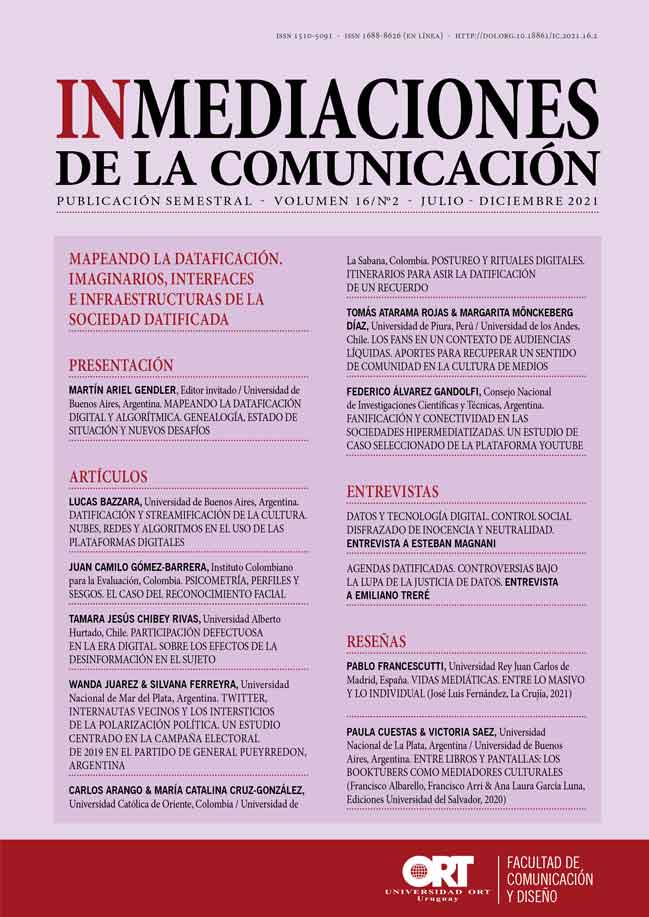Defective participation in the digital era
On the effects of disinformation and misinformation on the subject
DOI:
https://doi.org/10.18861/ic.2021.16.2.3157Keywords:
information, defective information, digital era, worldview, defective participationAbstract
Since the close of the XXth century, society has been undergoing a digital transformation. Social activity, formerly conducted only face to face, now operates in a digitalized space, where information is conceived not only as data, but as an informational operation. This new digital era brings with it great repercussions on the communicational level, but it also goes through the digital agency and the political participation of the subjects. On occasion, build up and acceleration of information processes –in unwanted quantities and volumes– can produce misinformation and disinformation, that is, abundant defective information that spreads through the digital platforms. This critical study will be guided by the following question: ¿What effect does defective information (or misinformation and disinformation) have over the subject’s agency in digital spaces? As a hypothesis, it is argued that defective information motivates a defective participation of the subject in the informational operation configured in the digital space. The effects of defective participations on subjects in the network must be considered a delicate matter and a focus of study. This proposal aims to address this need.
Downloads
References
Aparici, R., & Osuna, S. (2013). La cultura de la participación. Revista Mediterránea de Comunicación, 4(2), 137-148. DOI: 10.14198/MEDCOM2013.4.2.07
Batista, R. J. & Valencia, H. B. (2012). La fragmentación como universalidad: el miedo a la hiperinformación en la sociedad del conocimiento. Encuentros, 10(2), 129-138.
Celis, C. (2019). Notas sobre el estatuto político de la imagen en la era de la visión artificial. Revista Barda, 8(5), 89-106.
D'Andrea, A. & Campoamor, E. (2020). La computación en el marco de un nuevo proyecto humanista: Releyendo a Dijkstra y Simondon. Pensando. Revista de Filosofía, 23(11), 106-118.
Dilthey, W. (2018). Teoría de la concepción del mundo. Ciudad de México: Fondo de Cultura Económica.
Echeverría, J. (2009). Cultura digital y memoria en red. Arbor, 737(185), 559-567.
Estrada-Cuzcano, A., Alfaro-Mendives, K. & Saavedra-Vásquez, V. (2020). Disinformation y Misinformation, Posverdad y Fake News: precisiones conceptuales, diferencias, similitudes y yuxtaposiciones. Información, cultura y sociedad, (42), 93-106. DOI: https://doi.org/10.34096/ics.i42.7427
Filinich, R. & Chibey, T. (2020a). Becoming and Individuation on the Encounter between Technical Apparatus and Natural System. M/C Journal, 23(4). DOI: https://doi.org/10.5204/mcj.1651
Filinich, R. & Chibey, T. (2020b). QATIPANA: Processes of Individuation on the Relationship Between Art, Machine and Natural Systems. Critical Hermeneutics, 4(1), 65-88. DOI: https://doi.org/10.13125/CH/4320
Floridi, L. (1996). Brave. Net. World: The Internet as a disinformation superhighway? The Electronic Library, 14(6), 509-514. DOI: http://dx.doi.org/10.2139/ssrn.3128817
Han, B.-C. (2014). En el enjambre. Barcelona: Herder Editorial.
Hendricks, V. F. & Hansen, P. G. (2016). Infostorms. Why do we'like'? Explaining individual behavior on the social net. Berne: Springer.
Horrocks, C. (2004). Marshall McLuhan y la realidad virtual. Barcelona: Gedisa.
Levi, S. & Guixaró, R. (2019). Fake news y desinformación. Barcelona: España.
Morales, U. R. (2018). El ciudadano digital: Fake news y posverdad en la era de internet. Ciudad de México: Océano.
Paglen, T. (2019). Imágenes invisibles, laFuga, 22. Recuperado de: https://lafuga.cl/imagenes-invisibles/944
Peñaloza, G. (2015). Una mirada desde la Didáctica de las Ciencias al concepto de visión del mundo. Educación y humanismo, 17(29), 308-320.
Sánchez, A. & Fernández-Valdés, M. (2020). Comportamiento informacional, infodemia y desinformación durante la pandemia de COVID-19. Anales de la Academia de Ciencias de Cuba, 10(2). Recuperado de: http://www.revistaccuba.sld.cu/index.php/revacc/article/view/882
Shannon, C. & Weaver, W. (1949). The mathematical theory of communication. Chicago: University of Illinois.
Simondon, G. (2015a). Comunicación e información. Buenos Aires: Editorial Cactus.
Simondon, G. (2015b). La individuación a la luz de las nociones de forma y de información. Buenos Aires: Editorial Cactus.
Vásquez, A., Sánchez, L. & Bolívar, W. (2018). Los espacios digitales en permanente definición y construcción. Un análisis desde los elementos formativos. Pedagogía y Saberes, 48, 71-82.
Vercelli, A (2013). La participación ciudadana en la era digital. Análisis de las tecnologías digitales que se utilizan para la gestión de derechos ciudadanos. Virtualis. Revista de cultura digital, 4(7), 115-129. Recuperado de: https://www.revistavirtualis.mx/index.php/virtualis/article/view/72/59.
Wiener, N. (1958). Cibernética y sociedad. Buenos Aires: Sudamericana.






